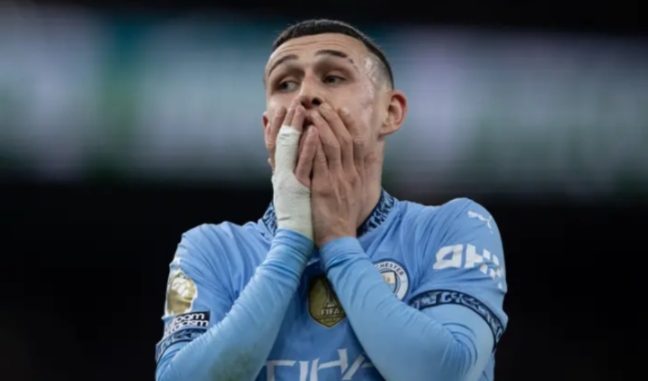
Mystery behind Phil Foden’s massive decline in form and it’s effect on the club this season
One of the Premier League’s most surprising developments this season has unquestionable been Phil Foden’s massive decline in form.
During the 2023/2024 campaign, the Manchester City midfielder was voted the PFA Players’ Player of the Year award winner but more importantly, he was arguably his side’s most important player as they won the title.
But this season, Phil Foden has been worryingly poor and despite a promising start to the year, he is yet to well and truly redeem himself.
Rio Ferdinand acknowledged Foden’s been out of form but he has come under far harsher stick over the course of the season.
Tony Cascarino described Foden as “unrecognisable” this campaign as well. Being the top player he is, the Englishman must be frustrated at all the attention coming his way for the wrong reasons.
Photo by Crystal Pix/MB Media/Getty Images
Photo by Crystal Pix/MB Media/Getty Images
A physical issue has hampered Phil Foden’s form all season
After having shown the world that he is capable of becoming Manchester City’s main man last season, Foden will primarily be gutted that he has been unable to do so this season.
Off the back of a difficult time during Euro 2024, the 24-year-old may have been more determined than ever to silence every doubter of his.
The Stockport-born technician’s struggles began from the start of the season, with Foden starting three games by October.
But the Daily Mail have revealed that a “physical problem” has plagued Foden for much of the ongoing term, having already confirmed he has suffered a degree of “mental fatigue” and his brain fogging during training sessions. The six-time Premier League winner is yet to confirm either issues, however.
PHIL FODEN STATS THIS SEASON
STARTS 28
GOALS 10
ASSISTS 6
The report mentions that Manchester City’s players have been “worried” about Foden as well, who is believed to read the criticism that comes his way on social media. As the Three Lions line up against Latvia on Monday, while Darren Bent stated Foden shouldn’t start for England, it will be interesting to see whether Thomas Tuchel sticks him on the right flank once again.
Phil Foden should take inspiration from one Man City star’s comeback
At this point of time, the decorated attacker will perhaps feel that the world is against him.
While the City superstar has been far from good enough this season, he still has plenty of years left to further cement his status as one of the best players in the world.
In John Stones, Foden has had a teammate who had his fair shares of lows.
One of Stones’ biggest issues were his constant injuries.
But the former Everton centre-back bounced back, particularly in the 2020/2021 season and became a figurehead for Manchester City and England, which Foden is well capable of doing as well.
Phil Foden’s meteoric rise from Manchester City’s academy to a pivotal first-team player was marked by his exceptional technical skills and game intelligence. However, the 2024-2025 season has seen a significant downturn in his form, raising concerns among fans and club officials alike. This decline has not only impacted Foden’s career trajectory but has also had tangible effects on Manchester City’s performance this season.
Factors Contributing to Foden’s Decline
1. Physical and Mental Fatigue: Following an intense 2023-2024 season, where Foden played a crucial role in Manchester City’s successes and participated in England’s Euro 2024 campaign, he returned to club duties exhibiting signs of burnout. Foden himself acknowledged feeling fatigued and not at his optimal physical condition, which adversely affected his early-season performances.
2. Positional Challenges: During Euro 2024, under then-manager Gareth Southgate, Foden was deployed on the left wing—a role differing from his preferred central attacking position. This adjustment limited his influence on matches and led to frustration, which he admitted impacted his mental state and subsequent performances for Manchester City.
3. Increased Competition and Tactical Adjustments: Manchester City’s acquisition of new attacking talents, including Julian Alvarez and Jack Grealish, intensified competition for starting spots. Manager Pep Guardiola’s tactical rotations and the need for versatility meant Foden was often played in varying roles, disrupting his consistency and rhythm on the field.
4. Injury Concerns: Persistent minor injuries have plagued Foden throughout the season, hindering his ability to maintain peak performance levels. These physical setbacks have contributed to his inconsistent form and limited his contributions on the pitch.
Impact on Manchester City’s Season
Foden’s dip in form has had several repercussions for Manchester City:
Attacking Efficiency: As a key creative force, Foden’s reduced effectiveness has led to a noticeable decline in the team’s attacking dynamism. His inability to replicate previous seasons’ goal and assist tallies has left a void in the offensive setup.
Team Morale and Cohesion: Foden’s struggles have mirrored broader challenges within the squad, contributing to a series of underwhelming performances and results. This has affected overall team morale and cohesion, as evidenced by fan dissatisfaction following defeats such as the 3-1 loss to Real Madrid.
Managerial Decisions: Pep Guardiola has faced difficult choices regarding team selection and tactics, balancing the need to support Foden through his slump while ensuring the team’s competitive edge. This balancing act has influenced match strategies and player rotations throughout the season.
Path to Recovery
Addressing Foden’s decline requires a multifaceted approach:
Physical Rehabilitation: Implementing tailored fitness programs to address fatigue and prevent injuries is crucial for Foden’s return to form.
Mental Health Support: Providing psychological support to help Foden manage the pressures of professional football and regain confidence is essential.
Consistent Positioning: Allowing Foden to play in his preferred central attacking role could enhance his performance and consistency.
Squad Rotation Management: Strategic rotation policies that balance competition and player well-being can help maintain overall team performance.
Phil Foden’s challenges this season underscore the complexities professional athletes face in maintaining peak performance. By addressing the underlying causes of his decline and implementing supportive measures, both Foden and Manchester City can work towards revitalizing his form and, consequently, the team’s success.
Source

Leave a Reply